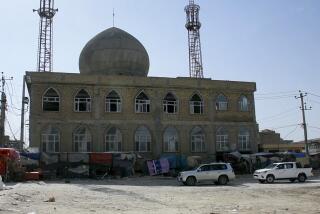Series of Bombings Rock Baghdad, Killing at Least 12
- Share via
BAGHDAD — A wave of bombings struck this anxious capital Wednesday, killing at least a dozen people 11 days before the nation’s landmark elections. Across the country, there were new reports of hostage taking, an ambush and summary executions.
Four bomb-laden vehicles detonated within 90 minutes, shattering the morning calm before most commuters hit the streets. Wednesday was the last day of work before a long holiday weekend for the Muslim feast of Eid al-Adha, marking the end of the annual pilgrimage to holy sites in Mecca, Saudi Arabia.
The apparent targets of the bombings were Iraqi police and armed forces and the Australian Embassy. Australia has been an adamant supporter of the Bush administration’s policies in Iraq.
A fifth car bomb was reported about noon near a Baghdad bank where police personnel were receiving their salaries.
Outside the capital, a car bomb killed a police officer in Hillah, south of Baghdad, and another targeted a U.S. convoy in the northern city of Mosul, news services reported.
North of the capital, insurgents ambushed and killed a British security officer, reportedly kidnapped a Japanese engineer, and, according to an Islamic website, executed two Iraqi technicians accused of helping set up computer links for elections in Mosul and Irbil.
Iraqi officials put the death toll from Wednesday’s Baghdad blasts at about a dozen; U.S. authorities cited “initial reports” that at least 26 had been killed. More than 20 people were injured.
Car and truck bombs have become the insurgents’ deadliest weapon. At least 1,712 people have been killed and almost 4,000 injured in more than 170 vehicle bombings in Iraq in the last 17 months, according to a Los Angeles Times compilation based on news reports and official statements.
Bombings have persisted even as U.S. troops and U.S.-trained Iraqi forces have launched a nationwide crackdown on militants, arresting hundreds, and bolstering the presence of police and soldiers in urban areas and the countryside alike.
Heavily armed Iraqi security officers, many donning facemasks to conceal their identities, have put up checkpoints throughout the capital. Pickup trucks filled with machine-gun toting Iraqi police and national guardsmen barrel through Baghdad, weaving their way through often-gridlocked streets.
Despite the violence, talk of delaying the Jan. 30 vote has waned and officials are moving ahead with preparations.
“Security is a serious challenge, but everything is on schedule,” said Farid Ayar, spokesman for the Independent Electoral Commission of Iraq, which is overseeing the vote.
About 90,000 ballot boxes have been flown to Baghdad’s international airport and stored in a warehouse there. Ayar said 50 million to 60 million forgery-proof ballots, printed mostly in Canada and Australia, also had been delivered.
Iraqis are to elect a 275-member transitional national assembly, which will be charged with writing a constitution and selecting a prime minister and a president. More than 7,000 candidates, and about 100 slates, are competing in the election.
Voters also will cast ballots for 18 provincial governments and a regional parliament for the Kurdish zone in the north.
Insurgents and their Sunni Muslim supporters view the elections as an illegitimate exercise that will further diminish Sunni Arabs’ once-dominant role in Iraq. Many Sunni groups have called for delaying the election or boycotting it.
Parties representing long-repressed Shiite Muslims -- who constitute a majority in Iraq -- and Kurds are expected to do well in the voting. U.S. Ambassador John D. Negroponte told reporters Wednesday that Washington was “committed to working with whatever government emanates” from the election.
The first attack Wednesday occurred about 7 a.m. outside the heavily barricaded Australian Embassy. The powerful truck bomb knocked out windows and dislodged window frames more than a block away and launched super-heated shards of metal shrapnel hundreds of yards.
Because of the early hour, there were few pedestrians and little traffic on the street. Two Iraqis were killed in the blast, officials said, and two Australian soldiers were among the wounded.
The insurgent group led by Jordanian-born militant Abu Musab Zarqawi claimed credit for the bombing near the Australian Embassy and several others, news services reported.
More to Read
Sign up for Essential California
The most important California stories and recommendations in your inbox every morning.
You may occasionally receive promotional content from the Los Angeles Times.













